3121MED Critical Reflection: Culture & First People Health Essay
VerifiedAdded on 2023/06/12
|9
|2927
|197
Essay
AI Summary
This essay provides a critical reflection on the impact of racism and cultural paradigms on the health of First People in Australia, specifically focusing on the effects of segregation and historical injustices. The author reflects on their own cultural viewpoints and assumptions, exploring how these influence perceptions and interactions within the healthcare setting. The essay delves into themes such as social Darwinism, stolen generation, dispossession, and cultural alienation. It examines the author's emotional response to learning about the profound and lasting negative effects of racism on Indigenous communities, questioning why this devastation was felt and what cultural viewpoints contributed to a lack of prior understanding. The reflection covers the dominance of Western viewpoints in healthcare and education, and the importance of cultural awareness and equality in providing holistic, person-centered care to Aboriginal and Torres Strait Islander peoples. The author expresses a commitment to advocating for equality and transforming their professional practice to better serve Indigenous patients.

UNIT:
NAME:
DATE:
NAME:
DATE:
Paraphrase This Document
Need a fresh take? Get an instant paraphrase of this document with our AI Paraphraser
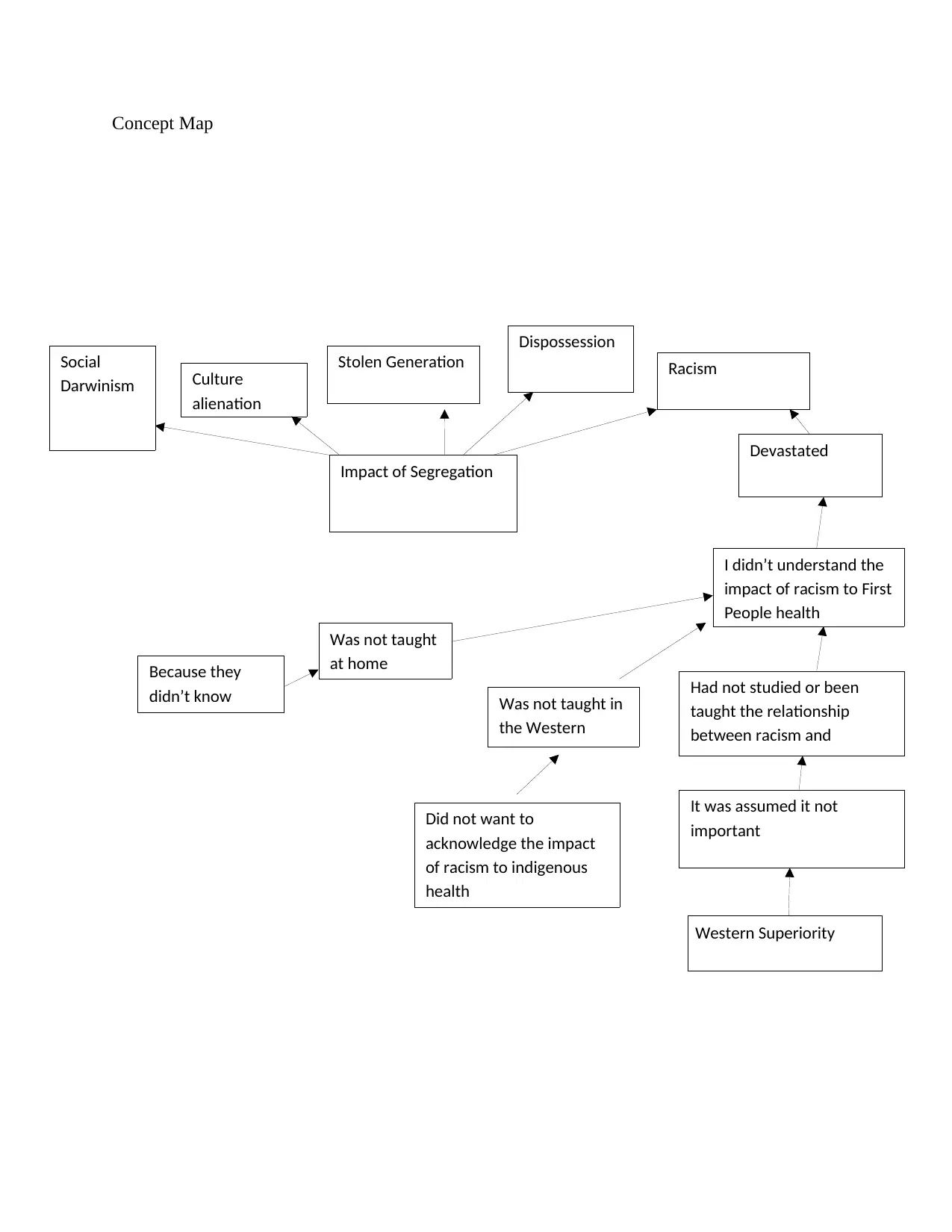
Concept Map
Impact of Segregation
Stolen Generation Racism
Culture
alienation
Social
Darwinism
Dispossession
Devastated
I didn’t understand the
impact of racism to First
People health
Had not studied or been
taught the relationship
between racism and
indeginous health
It was assumed it not
important
Western Superiority
Was not taught in
the Western
Eduction
Did not want to
acknowledge the impact
of racism to indigenous
health
Was not taught
at home
Because they
didn’t know
Impact of Segregation
Stolen Generation Racism
Culture
alienation
Social
Darwinism
Dispossession
Devastated
I didn’t understand the
impact of racism to First
People health
Had not studied or been
taught the relationship
between racism and
indeginous health
It was assumed it not
important
Western Superiority
Was not taught in
the Western
Eduction
Did not want to
acknowledge the impact
of racism to indigenous
health
Was not taught
at home
Because they
didn’t know
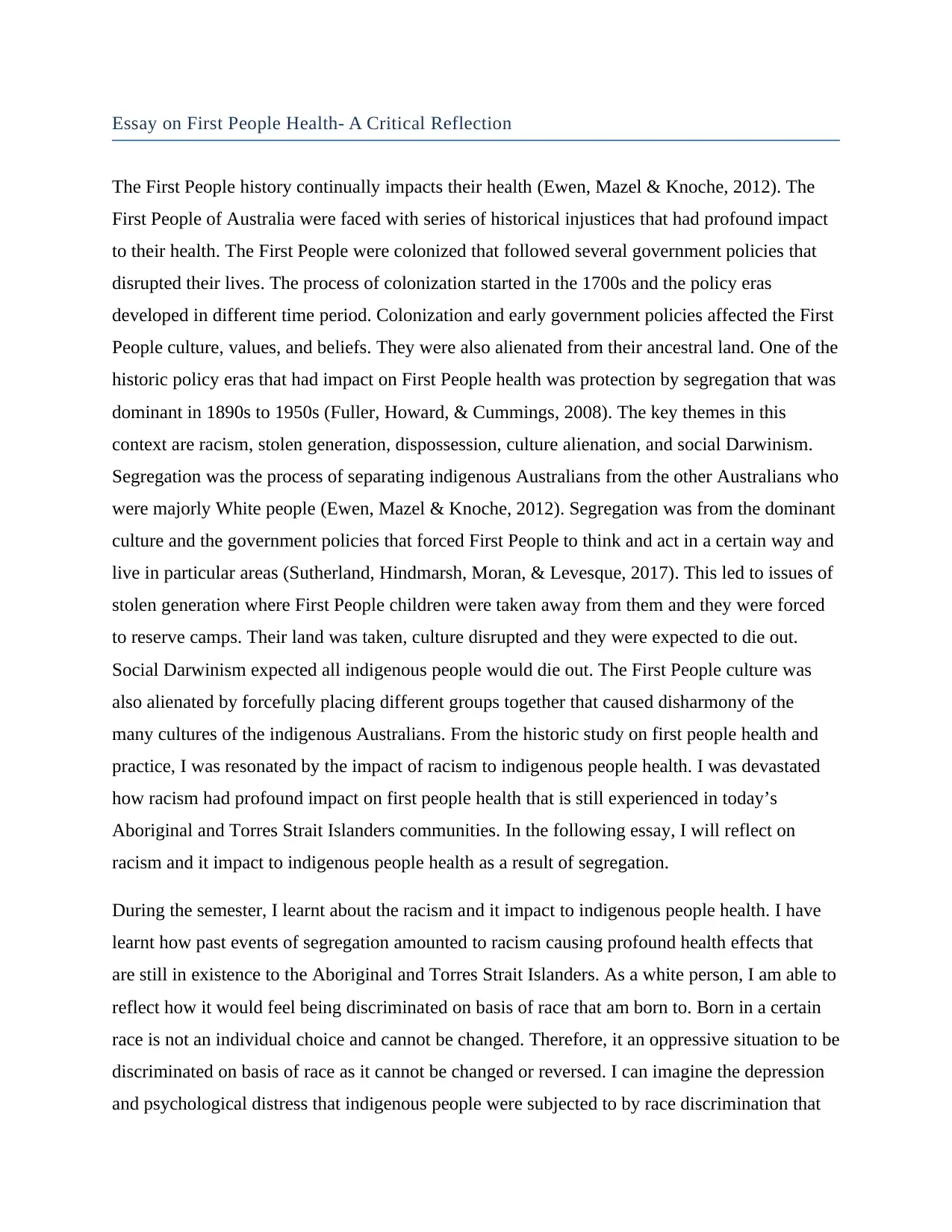
Essay on First People Health- A Critical Reflection
The First People history continually impacts their health (Ewen, Mazel & Knoche, 2012). The
First People of Australia were faced with series of historical injustices that had profound impact
to their health. The First People were colonized that followed several government policies that
disrupted their lives. The process of colonization started in the 1700s and the policy eras
developed in different time period. Colonization and early government policies affected the First
People culture, values, and beliefs. They were also alienated from their ancestral land. One of the
historic policy eras that had impact on First People health was protection by segregation that was
dominant in 1890s to 1950s (Fuller, Howard, & Cummings, 2008). The key themes in this
context are racism, stolen generation, dispossession, culture alienation, and social Darwinism.
Segregation was the process of separating indigenous Australians from the other Australians who
were majorly White people (Ewen, Mazel & Knoche, 2012). Segregation was from the dominant
culture and the government policies that forced First People to think and act in a certain way and
live in particular areas (Sutherland, Hindmarsh, Moran, & Levesque, 2017). This led to issues of
stolen generation where First People children were taken away from them and they were forced
to reserve camps. Their land was taken, culture disrupted and they were expected to die out.
Social Darwinism expected all indigenous people would die out. The First People culture was
also alienated by forcefully placing different groups together that caused disharmony of the
many cultures of the indigenous Australians. From the historic study on first people health and
practice, I was resonated by the impact of racism to indigenous people health. I was devastated
how racism had profound impact on first people health that is still experienced in today’s
Aboriginal and Torres Strait Islanders communities. In the following essay, I will reflect on
racism and it impact to indigenous people health as a result of segregation.
During the semester, I learnt about the racism and it impact to indigenous people health. I have
learnt how past events of segregation amounted to racism causing profound health effects that
are still in existence to the Aboriginal and Torres Strait Islanders. As a white person, I am able to
reflect how it would feel being discriminated on basis of race that am born to. Born in a certain
race is not an individual choice and cannot be changed. Therefore, it an oppressive situation to be
discriminated on basis of race as it cannot be changed or reversed. I can imagine the depression
and psychological distress that indigenous people were subjected to by race discrimination that
The First People history continually impacts their health (Ewen, Mazel & Knoche, 2012). The
First People of Australia were faced with series of historical injustices that had profound impact
to their health. The First People were colonized that followed several government policies that
disrupted their lives. The process of colonization started in the 1700s and the policy eras
developed in different time period. Colonization and early government policies affected the First
People culture, values, and beliefs. They were also alienated from their ancestral land. One of the
historic policy eras that had impact on First People health was protection by segregation that was
dominant in 1890s to 1950s (Fuller, Howard, & Cummings, 2008). The key themes in this
context are racism, stolen generation, dispossession, culture alienation, and social Darwinism.
Segregation was the process of separating indigenous Australians from the other Australians who
were majorly White people (Ewen, Mazel & Knoche, 2012). Segregation was from the dominant
culture and the government policies that forced First People to think and act in a certain way and
live in particular areas (Sutherland, Hindmarsh, Moran, & Levesque, 2017). This led to issues of
stolen generation where First People children were taken away from them and they were forced
to reserve camps. Their land was taken, culture disrupted and they were expected to die out.
Social Darwinism expected all indigenous people would die out. The First People culture was
also alienated by forcefully placing different groups together that caused disharmony of the
many cultures of the indigenous Australians. From the historic study on first people health and
practice, I was resonated by the impact of racism to indigenous people health. I was devastated
how racism had profound impact on first people health that is still experienced in today’s
Aboriginal and Torres Strait Islanders communities. In the following essay, I will reflect on
racism and it impact to indigenous people health as a result of segregation.
During the semester, I learnt about the racism and it impact to indigenous people health. I have
learnt how past events of segregation amounted to racism causing profound health effects that
are still in existence to the Aboriginal and Torres Strait Islanders. As a white person, I am able to
reflect how it would feel being discriminated on basis of race that am born to. Born in a certain
race is not an individual choice and cannot be changed. Therefore, it an oppressive situation to be
discriminated on basis of race as it cannot be changed or reversed. I can imagine the depression
and psychological distress that indigenous people were subjected to by race discrimination that
⊘ This is a preview!⊘
Do you want full access?
Subscribe today to unlock all pages.

Trusted by 1+ million students worldwide
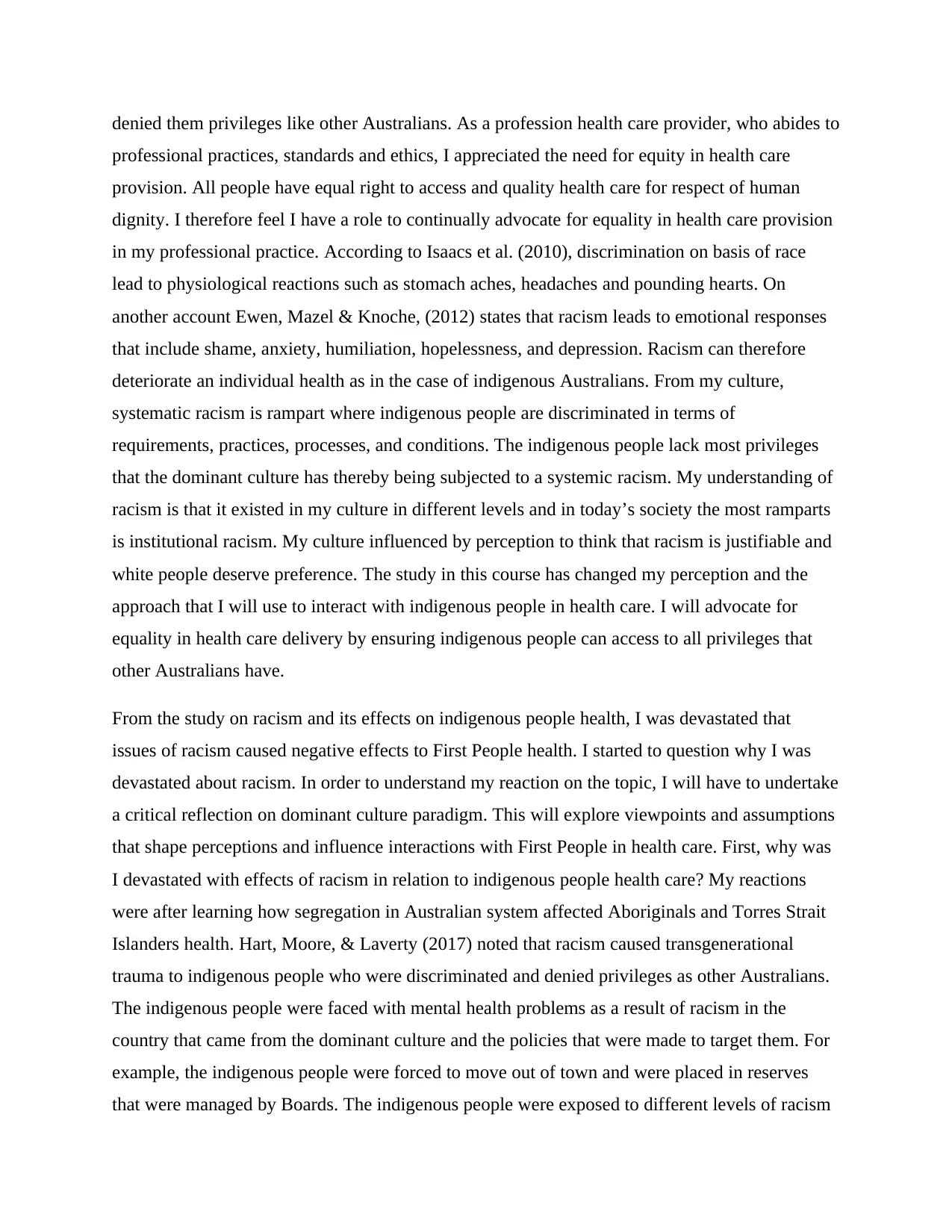
denied them privileges like other Australians. As a profession health care provider, who abides to
professional practices, standards and ethics, I appreciated the need for equity in health care
provision. All people have equal right to access and quality health care for respect of human
dignity. I therefore feel I have a role to continually advocate for equality in health care provision
in my professional practice. According to Isaacs et al. (2010), discrimination on basis of race
lead to physiological reactions such as stomach aches, headaches and pounding hearts. On
another account Ewen, Mazel & Knoche, (2012) states that racism leads to emotional responses
that include shame, anxiety, humiliation, hopelessness, and depression. Racism can therefore
deteriorate an individual health as in the case of indigenous Australians. From my culture,
systematic racism is rampart where indigenous people are discriminated in terms of
requirements, practices, processes, and conditions. The indigenous people lack most privileges
that the dominant culture has thereby being subjected to a systemic racism. My understanding of
racism is that it existed in my culture in different levels and in today’s society the most ramparts
is institutional racism. My culture influenced by perception to think that racism is justifiable and
white people deserve preference. The study in this course has changed my perception and the
approach that I will use to interact with indigenous people in health care. I will advocate for
equality in health care delivery by ensuring indigenous people can access to all privileges that
other Australians have.
From the study on racism and its effects on indigenous people health, I was devastated that
issues of racism caused negative effects to First People health. I started to question why I was
devastated about racism. In order to understand my reaction on the topic, I will have to undertake
a critical reflection on dominant culture paradigm. This will explore viewpoints and assumptions
that shape perceptions and influence interactions with First People in health care. First, why was
I devastated with effects of racism in relation to indigenous people health care? My reactions
were after learning how segregation in Australian system affected Aboriginals and Torres Strait
Islanders health. Hart, Moore, & Laverty (2017) noted that racism caused transgenerational
trauma to indigenous people who were discriminated and denied privileges as other Australians.
The indigenous people were faced with mental health problems as a result of racism in the
country that came from the dominant culture and the policies that were made to target them. For
example, the indigenous people were forced to move out of town and were placed in reserves
that were managed by Boards. The indigenous people were exposed to different levels of racism
professional practices, standards and ethics, I appreciated the need for equity in health care
provision. All people have equal right to access and quality health care for respect of human
dignity. I therefore feel I have a role to continually advocate for equality in health care provision
in my professional practice. According to Isaacs et al. (2010), discrimination on basis of race
lead to physiological reactions such as stomach aches, headaches and pounding hearts. On
another account Ewen, Mazel & Knoche, (2012) states that racism leads to emotional responses
that include shame, anxiety, humiliation, hopelessness, and depression. Racism can therefore
deteriorate an individual health as in the case of indigenous Australians. From my culture,
systematic racism is rampart where indigenous people are discriminated in terms of
requirements, practices, processes, and conditions. The indigenous people lack most privileges
that the dominant culture has thereby being subjected to a systemic racism. My understanding of
racism is that it existed in my culture in different levels and in today’s society the most ramparts
is institutional racism. My culture influenced by perception to think that racism is justifiable and
white people deserve preference. The study in this course has changed my perception and the
approach that I will use to interact with indigenous people in health care. I will advocate for
equality in health care delivery by ensuring indigenous people can access to all privileges that
other Australians have.
From the study on racism and its effects on indigenous people health, I was devastated that
issues of racism caused negative effects to First People health. I started to question why I was
devastated about racism. In order to understand my reaction on the topic, I will have to undertake
a critical reflection on dominant culture paradigm. This will explore viewpoints and assumptions
that shape perceptions and influence interactions with First People in health care. First, why was
I devastated with effects of racism in relation to indigenous people health care? My reactions
were after learning how segregation in Australian system affected Aboriginals and Torres Strait
Islanders health. Hart, Moore, & Laverty (2017) noted that racism caused transgenerational
trauma to indigenous people who were discriminated and denied privileges as other Australians.
The indigenous people were faced with mental health problems as a result of racism in the
country that came from the dominant culture and the policies that were made to target them. For
example, the indigenous people were forced to move out of town and were placed in reserves
that were managed by Boards. The indigenous people were exposed to different levels of racism
Paraphrase This Document
Need a fresh take? Get an instant paraphrase of this document with our AI Paraphraser
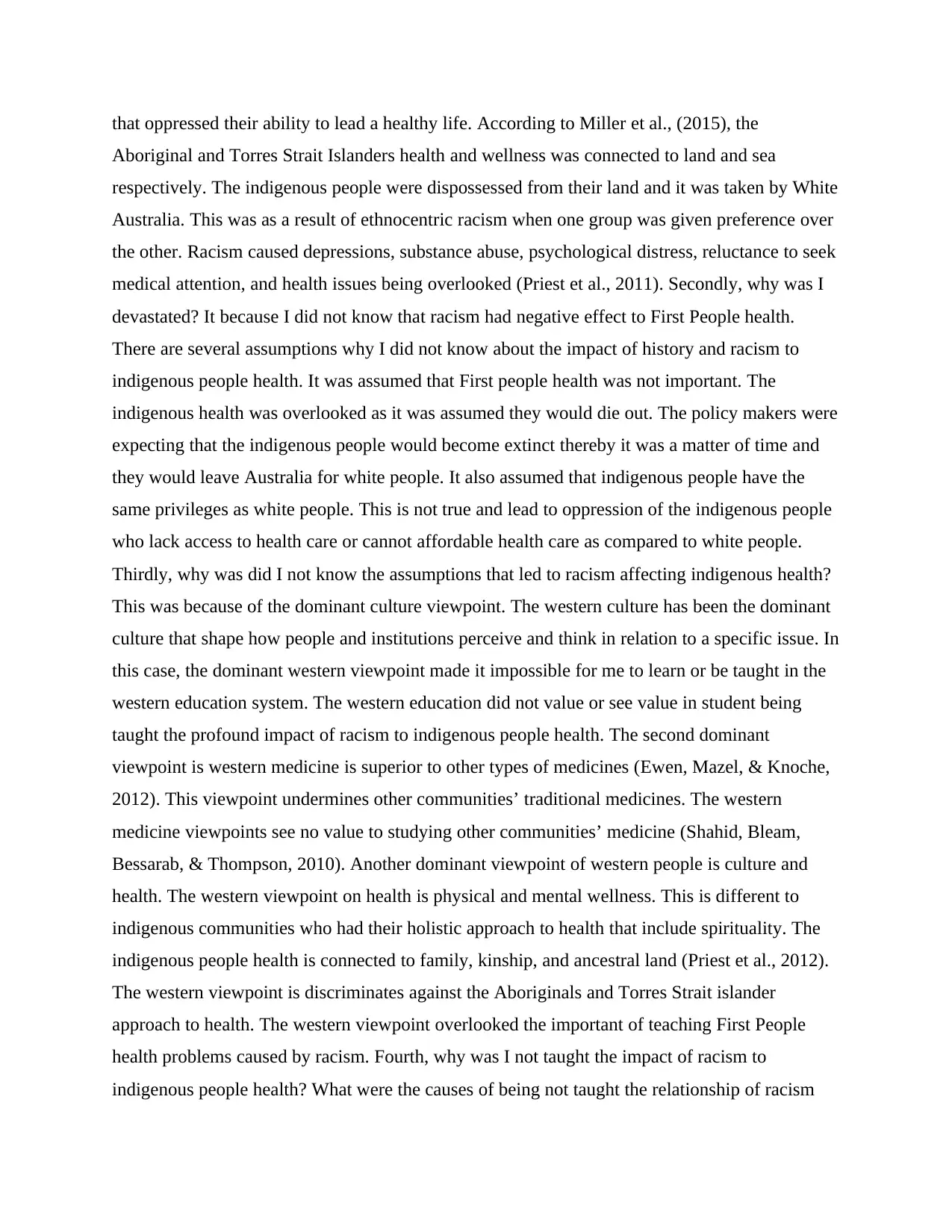
that oppressed their ability to lead a healthy life. According to Miller et al., (2015), the
Aboriginal and Torres Strait Islanders health and wellness was connected to land and sea
respectively. The indigenous people were dispossessed from their land and it was taken by White
Australia. This was as a result of ethnocentric racism when one group was given preference over
the other. Racism caused depressions, substance abuse, psychological distress, reluctance to seek
medical attention, and health issues being overlooked (Priest et al., 2011). Secondly, why was I
devastated? It because I did not know that racism had negative effect to First People health.
There are several assumptions why I did not know about the impact of history and racism to
indigenous people health. It was assumed that First people health was not important. The
indigenous health was overlooked as it was assumed they would die out. The policy makers were
expecting that the indigenous people would become extinct thereby it was a matter of time and
they would leave Australia for white people. It also assumed that indigenous people have the
same privileges as white people. This is not true and lead to oppression of the indigenous people
who lack access to health care or cannot affordable health care as compared to white people.
Thirdly, why was did I not know the assumptions that led to racism affecting indigenous health?
This was because of the dominant culture viewpoint. The western culture has been the dominant
culture that shape how people and institutions perceive and think in relation to a specific issue. In
this case, the dominant western viewpoint made it impossible for me to learn or be taught in the
western education system. The western education did not value or see value in student being
taught the profound impact of racism to indigenous people health. The second dominant
viewpoint is western medicine is superior to other types of medicines (Ewen, Mazel, & Knoche,
2012). This viewpoint undermines other communities’ traditional medicines. The western
medicine viewpoints see no value to studying other communities’ medicine (Shahid, Bleam,
Bessarab, & Thompson, 2010). Another dominant viewpoint of western people is culture and
health. The western viewpoint on health is physical and mental wellness. This is different to
indigenous communities who had their holistic approach to health that include spirituality. The
indigenous people health is connected to family, kinship, and ancestral land (Priest et al., 2012).
The western viewpoint is discriminates against the Aboriginals and Torres Strait islander
approach to health. The western viewpoint overlooked the important of teaching First People
health problems caused by racism. Fourth, why was I not taught the impact of racism to
indigenous people health? What were the causes of being not taught the relationship of racism
Aboriginal and Torres Strait Islanders health and wellness was connected to land and sea
respectively. The indigenous people were dispossessed from their land and it was taken by White
Australia. This was as a result of ethnocentric racism when one group was given preference over
the other. Racism caused depressions, substance abuse, psychological distress, reluctance to seek
medical attention, and health issues being overlooked (Priest et al., 2011). Secondly, why was I
devastated? It because I did not know that racism had negative effect to First People health.
There are several assumptions why I did not know about the impact of history and racism to
indigenous people health. It was assumed that First people health was not important. The
indigenous health was overlooked as it was assumed they would die out. The policy makers were
expecting that the indigenous people would become extinct thereby it was a matter of time and
they would leave Australia for white people. It also assumed that indigenous people have the
same privileges as white people. This is not true and lead to oppression of the indigenous people
who lack access to health care or cannot affordable health care as compared to white people.
Thirdly, why was did I not know the assumptions that led to racism affecting indigenous health?
This was because of the dominant culture viewpoint. The western culture has been the dominant
culture that shape how people and institutions perceive and think in relation to a specific issue. In
this case, the dominant western viewpoint made it impossible for me to learn or be taught in the
western education system. The western education did not value or see value in student being
taught the profound impact of racism to indigenous people health. The second dominant
viewpoint is western medicine is superior to other types of medicines (Ewen, Mazel, & Knoche,
2012). This viewpoint undermines other communities’ traditional medicines. The western
medicine viewpoints see no value to studying other communities’ medicine (Shahid, Bleam,
Bessarab, & Thompson, 2010). Another dominant viewpoint of western people is culture and
health. The western viewpoint on health is physical and mental wellness. This is different to
indigenous communities who had their holistic approach to health that include spirituality. The
indigenous people health is connected to family, kinship, and ancestral land (Priest et al., 2012).
The western viewpoint is discriminates against the Aboriginals and Torres Strait islander
approach to health. The western viewpoint overlooked the important of teaching First People
health problems caused by racism. Fourth, why was I not taught the impact of racism to
indigenous people health? What were the causes of being not taught the relationship of racism
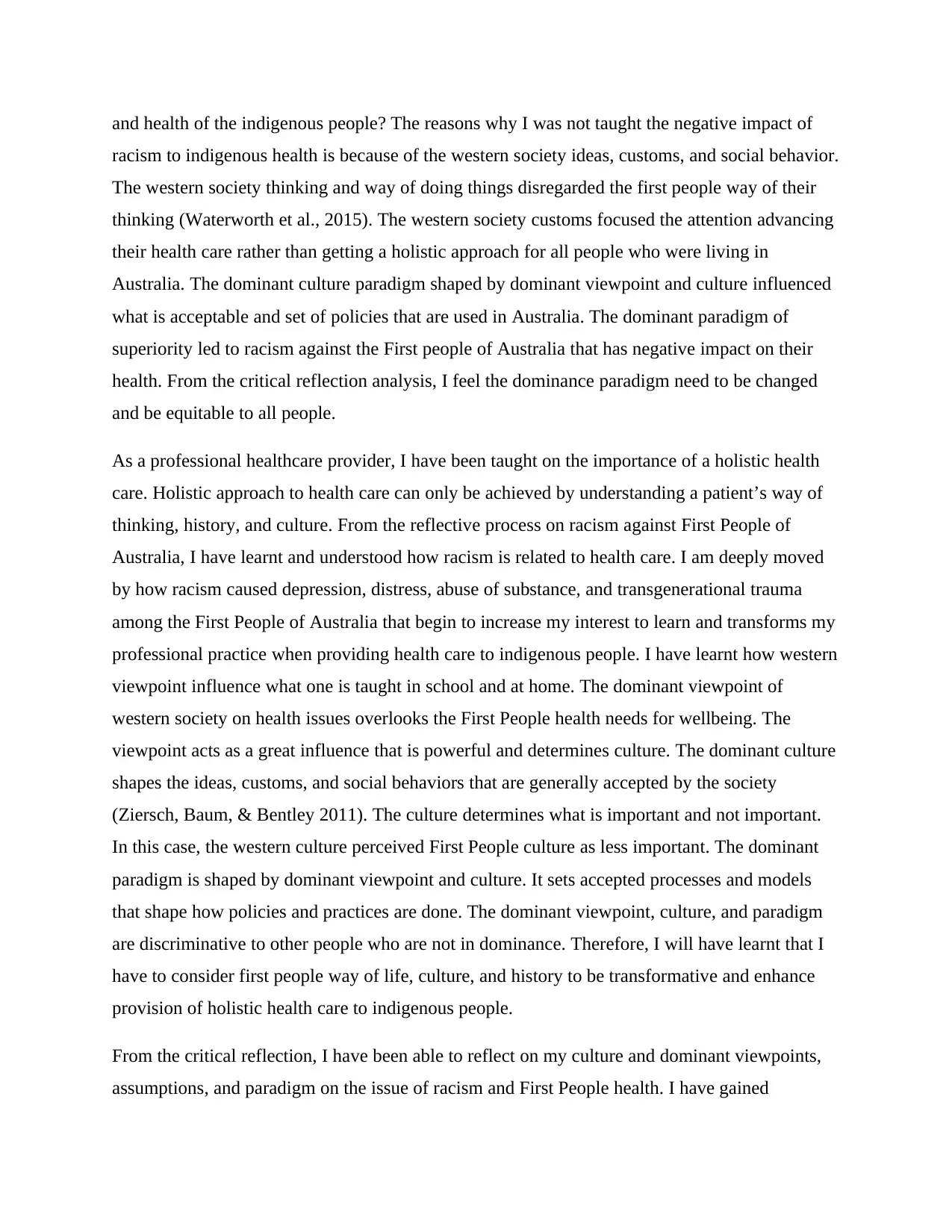
and health of the indigenous people? The reasons why I was not taught the negative impact of
racism to indigenous health is because of the western society ideas, customs, and social behavior.
The western society thinking and way of doing things disregarded the first people way of their
thinking (Waterworth et al., 2015). The western society customs focused the attention advancing
their health care rather than getting a holistic approach for all people who were living in
Australia. The dominant culture paradigm shaped by dominant viewpoint and culture influenced
what is acceptable and set of policies that are used in Australia. The dominant paradigm of
superiority led to racism against the First people of Australia that has negative impact on their
health. From the critical reflection analysis, I feel the dominance paradigm need to be changed
and be equitable to all people.
As a professional healthcare provider, I have been taught on the importance of a holistic health
care. Holistic approach to health care can only be achieved by understanding a patient’s way of
thinking, history, and culture. From the reflective process on racism against First People of
Australia, I have learnt and understood how racism is related to health care. I am deeply moved
by how racism caused depression, distress, abuse of substance, and transgenerational trauma
among the First People of Australia that begin to increase my interest to learn and transforms my
professional practice when providing health care to indigenous people. I have learnt how western
viewpoint influence what one is taught in school and at home. The dominant viewpoint of
western society on health issues overlooks the First People health needs for wellbeing. The
viewpoint acts as a great influence that is powerful and determines culture. The dominant culture
shapes the ideas, customs, and social behaviors that are generally accepted by the society
(Ziersch, Baum, & Bentley 2011). The culture determines what is important and not important.
In this case, the western culture perceived First People culture as less important. The dominant
paradigm is shaped by dominant viewpoint and culture. It sets accepted processes and models
that shape how policies and practices are done. The dominant viewpoint, culture, and paradigm
are discriminative to other people who are not in dominance. Therefore, I will have learnt that I
have to consider first people way of life, culture, and history to be transformative and enhance
provision of holistic health care to indigenous people.
From the critical reflection, I have been able to reflect on my culture and dominant viewpoints,
assumptions, and paradigm on the issue of racism and First People health. I have gained
racism to indigenous health is because of the western society ideas, customs, and social behavior.
The western society thinking and way of doing things disregarded the first people way of their
thinking (Waterworth et al., 2015). The western society customs focused the attention advancing
their health care rather than getting a holistic approach for all people who were living in
Australia. The dominant culture paradigm shaped by dominant viewpoint and culture influenced
what is acceptable and set of policies that are used in Australia. The dominant paradigm of
superiority led to racism against the First people of Australia that has negative impact on their
health. From the critical reflection analysis, I feel the dominance paradigm need to be changed
and be equitable to all people.
As a professional healthcare provider, I have been taught on the importance of a holistic health
care. Holistic approach to health care can only be achieved by understanding a patient’s way of
thinking, history, and culture. From the reflective process on racism against First People of
Australia, I have learnt and understood how racism is related to health care. I am deeply moved
by how racism caused depression, distress, abuse of substance, and transgenerational trauma
among the First People of Australia that begin to increase my interest to learn and transforms my
professional practice when providing health care to indigenous people. I have learnt how western
viewpoint influence what one is taught in school and at home. The dominant viewpoint of
western society on health issues overlooks the First People health needs for wellbeing. The
viewpoint acts as a great influence that is powerful and determines culture. The dominant culture
shapes the ideas, customs, and social behaviors that are generally accepted by the society
(Ziersch, Baum, & Bentley 2011). The culture determines what is important and not important.
In this case, the western culture perceived First People culture as less important. The dominant
paradigm is shaped by dominant viewpoint and culture. It sets accepted processes and models
that shape how policies and practices are done. The dominant viewpoint, culture, and paradigm
are discriminative to other people who are not in dominance. Therefore, I will have learnt that I
have to consider first people way of life, culture, and history to be transformative and enhance
provision of holistic health care to indigenous people.
From the critical reflection, I have been able to reflect on my culture and dominant viewpoints,
assumptions, and paradigm on the issue of racism and First People health. I have gained
⊘ This is a preview!⊘
Do you want full access?
Subscribe today to unlock all pages.

Trusted by 1+ million students worldwide
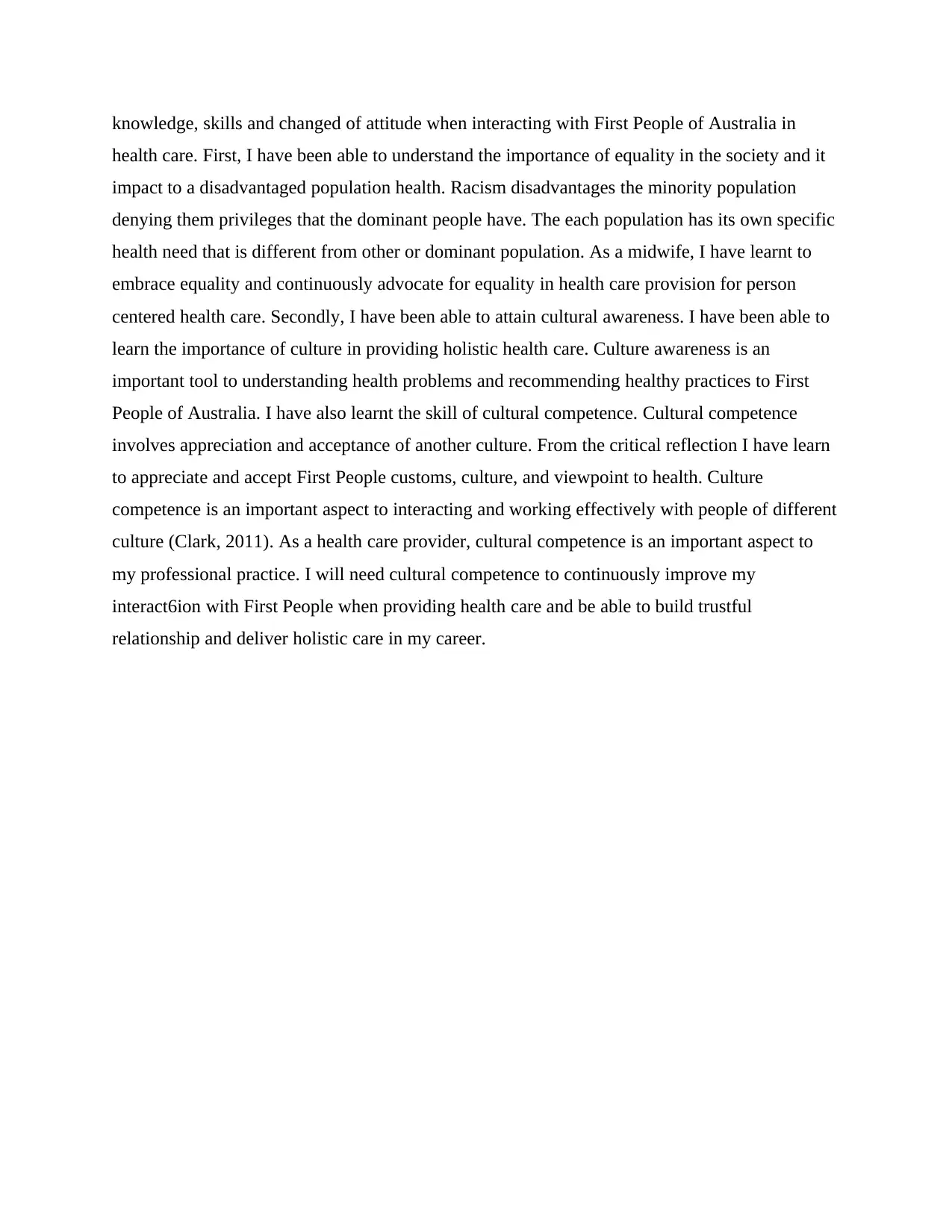
knowledge, skills and changed of attitude when interacting with First People of Australia in
health care. First, I have been able to understand the importance of equality in the society and it
impact to a disadvantaged population health. Racism disadvantages the minority population
denying them privileges that the dominant people have. The each population has its own specific
health need that is different from other or dominant population. As a midwife, I have learnt to
embrace equality and continuously advocate for equality in health care provision for person
centered health care. Secondly, I have been able to attain cultural awareness. I have been able to
learn the importance of culture in providing holistic health care. Culture awareness is an
important tool to understanding health problems and recommending healthy practices to First
People of Australia. I have also learnt the skill of cultural competence. Cultural competence
involves appreciation and acceptance of another culture. From the critical reflection I have learn
to appreciate and accept First People customs, culture, and viewpoint to health. Culture
competence is an important aspect to interacting and working effectively with people of different
culture (Clark, 2011). As a health care provider, cultural competence is an important aspect to
my professional practice. I will need cultural competence to continuously improve my
interact6ion with First People when providing health care and be able to build trustful
relationship and deliver holistic care in my career.
health care. First, I have been able to understand the importance of equality in the society and it
impact to a disadvantaged population health. Racism disadvantages the minority population
denying them privileges that the dominant people have. The each population has its own specific
health need that is different from other or dominant population. As a midwife, I have learnt to
embrace equality and continuously advocate for equality in health care provision for person
centered health care. Secondly, I have been able to attain cultural awareness. I have been able to
learn the importance of culture in providing holistic health care. Culture awareness is an
important tool to understanding health problems and recommending healthy practices to First
People of Australia. I have also learnt the skill of cultural competence. Cultural competence
involves appreciation and acceptance of another culture. From the critical reflection I have learn
to appreciate and accept First People customs, culture, and viewpoint to health. Culture
competence is an important aspect to interacting and working effectively with people of different
culture (Clark, 2011). As a health care provider, cultural competence is an important aspect to
my professional practice. I will need cultural competence to continuously improve my
interact6ion with First People when providing health care and be able to build trustful
relationship and deliver holistic care in my career.
Paraphrase This Document
Need a fresh take? Get an instant paraphrase of this document with our AI Paraphraser
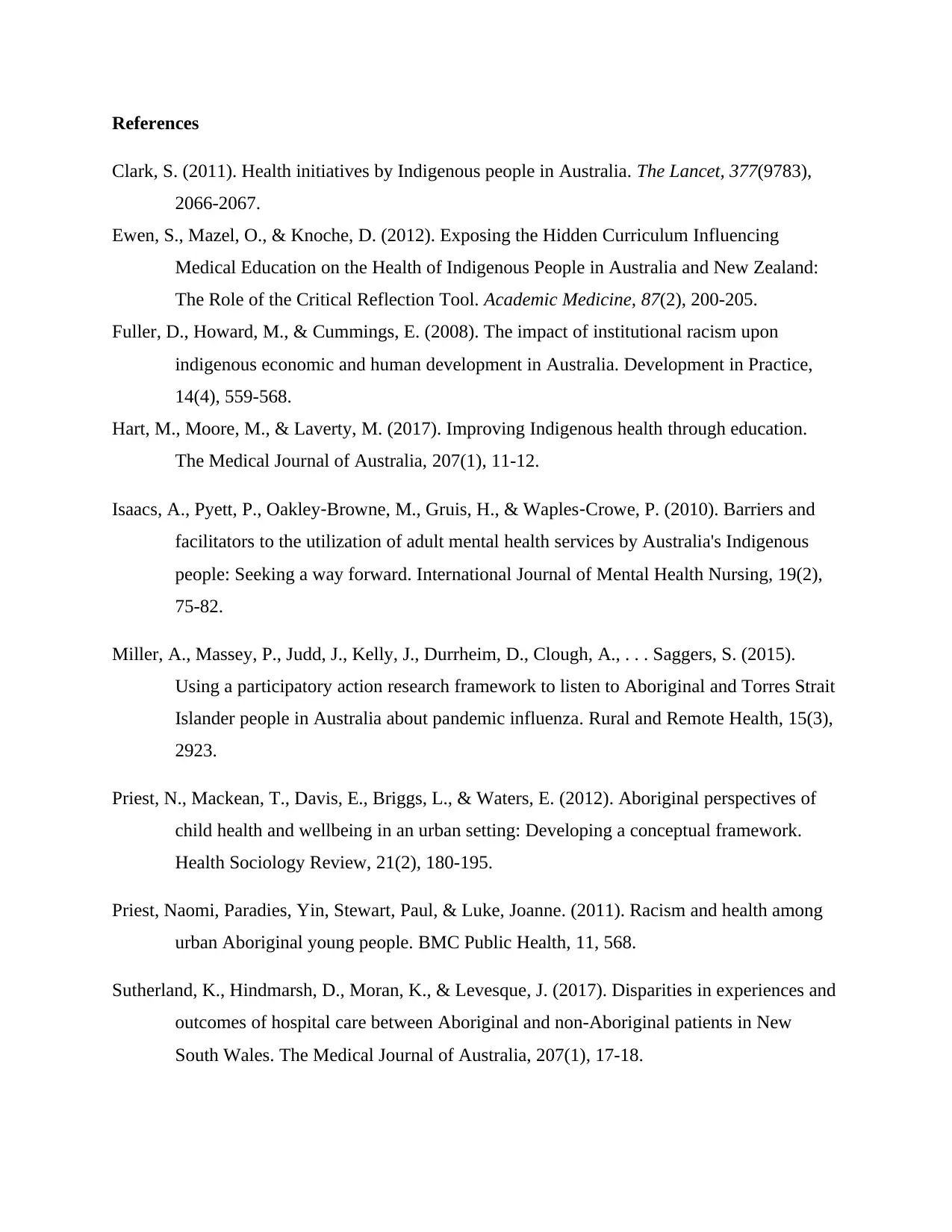
References
Clark, S. (2011). Health initiatives by Indigenous people in Australia. The Lancet, 377(9783),
2066-2067.
Ewen, S., Mazel, O., & Knoche, D. (2012). Exposing the Hidden Curriculum Influencing
Medical Education on the Health of Indigenous People in Australia and New Zealand:
The Role of the Critical Reflection Tool. Academic Medicine, 87(2), 200-205.
Fuller, D., Howard, M., & Cummings, E. (2008). The impact of institutional racism upon
indigenous economic and human development in Australia. Development in Practice,
14(4), 559-568.
Hart, M., Moore, M., & Laverty, M. (2017). Improving Indigenous health through education.
The Medical Journal of Australia, 207(1), 11-12.
Isaacs, A., Pyett, P., Oakley‐Browne, M., Gruis, H., & Waples‐Crowe, P. (2010). Barriers and
facilitators to the utilization of adult mental health services by Australia's Indigenous
people: Seeking a way forward. International Journal of Mental Health Nursing, 19(2),
75-82.
Miller, A., Massey, P., Judd, J., Kelly, J., Durrheim, D., Clough, A., . . . Saggers, S. (2015).
Using a participatory action research framework to listen to Aboriginal and Torres Strait
Islander people in Australia about pandemic influenza. Rural and Remote Health, 15(3),
2923.
Priest, N., Mackean, T., Davis, E., Briggs, L., & Waters, E. (2012). Aboriginal perspectives of
child health and wellbeing in an urban setting: Developing a conceptual framework.
Health Sociology Review, 21(2), 180-195.
Priest, Naomi, Paradies, Yin, Stewart, Paul, & Luke, Joanne. (2011). Racism and health among
urban Aboriginal young people. BMC Public Health, 11, 568.
Sutherland, K., Hindmarsh, D., Moran, K., & Levesque, J. (2017). Disparities in experiences and
outcomes of hospital care between Aboriginal and non-Aboriginal patients in New
South Wales. The Medical Journal of Australia, 207(1), 17-18.
Clark, S. (2011). Health initiatives by Indigenous people in Australia. The Lancet, 377(9783),
2066-2067.
Ewen, S., Mazel, O., & Knoche, D. (2012). Exposing the Hidden Curriculum Influencing
Medical Education on the Health of Indigenous People in Australia and New Zealand:
The Role of the Critical Reflection Tool. Academic Medicine, 87(2), 200-205.
Fuller, D., Howard, M., & Cummings, E. (2008). The impact of institutional racism upon
indigenous economic and human development in Australia. Development in Practice,
14(4), 559-568.
Hart, M., Moore, M., & Laverty, M. (2017). Improving Indigenous health through education.
The Medical Journal of Australia, 207(1), 11-12.
Isaacs, A., Pyett, P., Oakley‐Browne, M., Gruis, H., & Waples‐Crowe, P. (2010). Barriers and
facilitators to the utilization of adult mental health services by Australia's Indigenous
people: Seeking a way forward. International Journal of Mental Health Nursing, 19(2),
75-82.
Miller, A., Massey, P., Judd, J., Kelly, J., Durrheim, D., Clough, A., . . . Saggers, S. (2015).
Using a participatory action research framework to listen to Aboriginal and Torres Strait
Islander people in Australia about pandemic influenza. Rural and Remote Health, 15(3),
2923.
Priest, N., Mackean, T., Davis, E., Briggs, L., & Waters, E. (2012). Aboriginal perspectives of
child health and wellbeing in an urban setting: Developing a conceptual framework.
Health Sociology Review, 21(2), 180-195.
Priest, Naomi, Paradies, Yin, Stewart, Paul, & Luke, Joanne. (2011). Racism and health among
urban Aboriginal young people. BMC Public Health, 11, 568.
Sutherland, K., Hindmarsh, D., Moran, K., & Levesque, J. (2017). Disparities in experiences and
outcomes of hospital care between Aboriginal and non-Aboriginal patients in New
South Wales. The Medical Journal of Australia, 207(1), 17-18.
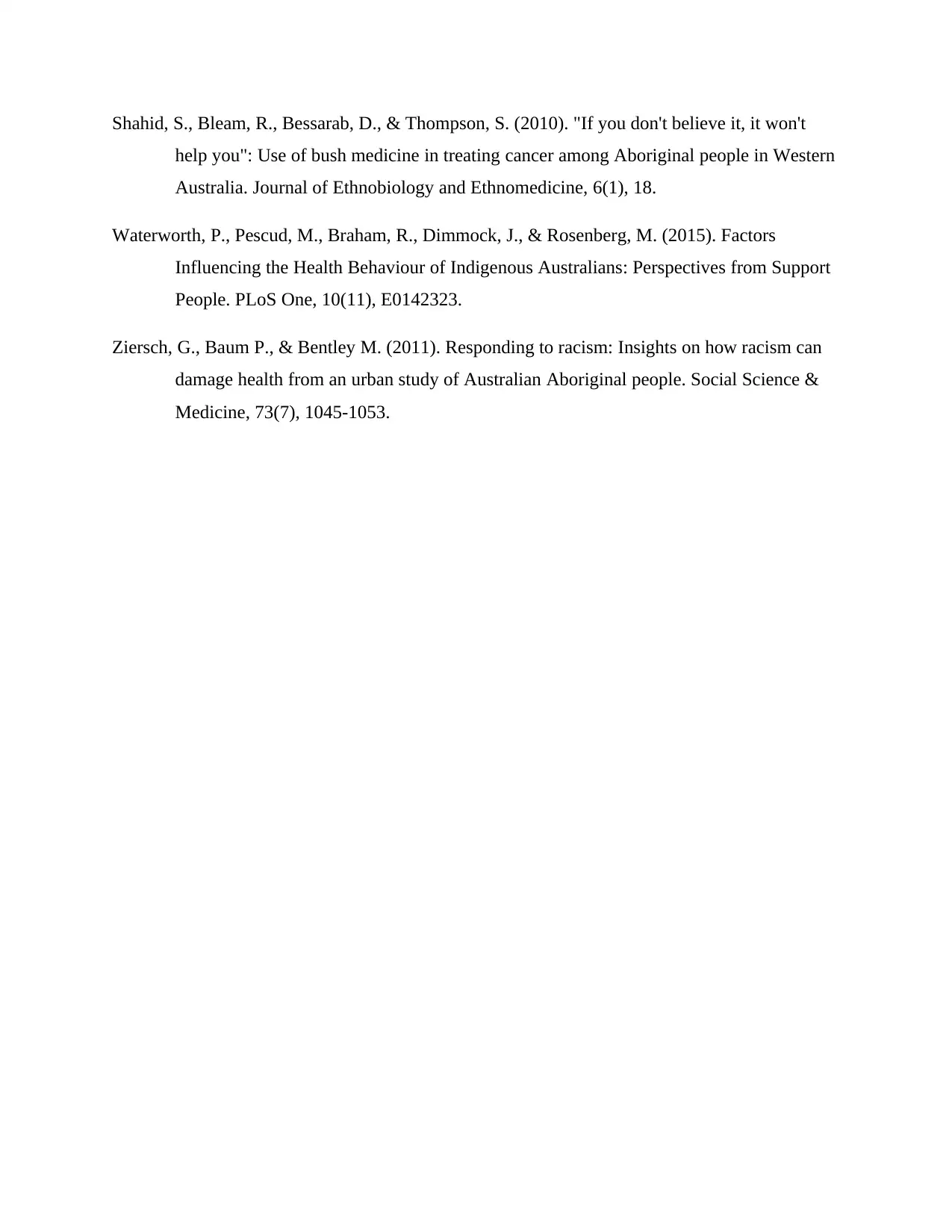
Shahid, S., Bleam, R., Bessarab, D., & Thompson, S. (2010). "If you don't believe it, it won't
help you": Use of bush medicine in treating cancer among Aboriginal people in Western
Australia. Journal of Ethnobiology and Ethnomedicine, 6(1), 18.
Waterworth, P., Pescud, M., Braham, R., Dimmock, J., & Rosenberg, M. (2015). Factors
Influencing the Health Behaviour of Indigenous Australians: Perspectives from Support
People. PLoS One, 10(11), E0142323.
Ziersch, G., Baum P., & Bentley M. (2011). Responding to racism: Insights on how racism can
damage health from an urban study of Australian Aboriginal people. Social Science &
Medicine, 73(7), 1045-1053.
help you": Use of bush medicine in treating cancer among Aboriginal people in Western
Australia. Journal of Ethnobiology and Ethnomedicine, 6(1), 18.
Waterworth, P., Pescud, M., Braham, R., Dimmock, J., & Rosenberg, M. (2015). Factors
Influencing the Health Behaviour of Indigenous Australians: Perspectives from Support
People. PLoS One, 10(11), E0142323.
Ziersch, G., Baum P., & Bentley M. (2011). Responding to racism: Insights on how racism can
damage health from an urban study of Australian Aboriginal people. Social Science &
Medicine, 73(7), 1045-1053.
⊘ This is a preview!⊘
Do you want full access?
Subscribe today to unlock all pages.

Trusted by 1+ million students worldwide
1 out of 9
Related Documents
Your All-in-One AI-Powered Toolkit for Academic Success.
+13062052269
info@desklib.com
Available 24*7 on WhatsApp / Email
![[object Object]](/_next/static/media/star-bottom.7253800d.svg)
Unlock your academic potential
Copyright © 2020–2026 A2Z Services. All Rights Reserved. Developed and managed by ZUCOL.



